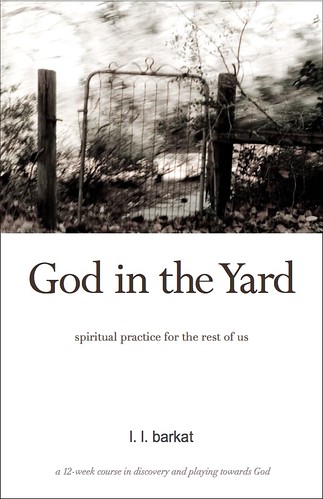Terracing

In the post Erosion Control, I mentioned Wendell Berry's observations about Peruvian farming, and mused that these same dynamics might be applied to our lives. So, we talked about "smallness of scale." And now it seems good to turn to terracing.
Terracing is a way to produce fruit from what might otherwise be fruitless land. It keeps soil in place and makes a patch of workable land right on the mountainside. Stonework cradles the soil, helping it stay put.
Says Berry, "the stonework in these walls is excellent...and provides a good insight into the agricultural thinking of the Incas...these walled terraces testify that [they] aimed at a permanent agriculture, and that aim accounts for the excellence of the workmanship." (p 45)
Conversely, we live in a throw-away culture. The "you can toss it" mindset pervades everything from the way we treat relationships to the way we treat goods, homes, communities, church families, and so on. And perhaps this accounts for the level of our workmanship (which is too often less impressive than the Incan stonework.)
But, what if we stopped and took the view of the Incas. This is what we've got to work with. We're staying here. How can we make the mountain fruitful? I marvel to think of what we might build, how we might terrace what seemed less than productive.
Seedlings in stones in Guatemala photo by Dorothy Olson Miller. Used with permission.
SSI (Standing Seedlings Invitation): If you post something related to this Seedling post, let me know and I'll link to you.
NEW LINKS TO THIS POST:
A Sense of Place
Incas & Disposable Everything
NEW LINKS TO SMALLNESS OF SCALE POST:
Smallness of Scale
Narcissus Gone Wild
Smaller Scale Meets Toy Closet
Labels: farming, life management, spirit, Wendell Berry















27 Comments:
Great picture by Dorothy. I've been mostly unplugged for about a week or so, but have loved your threads lately, L.L.
LL-I think the whole throw-away culture we live in is in large part due to the overwhelming number of choices we have (the all-you-can-eat buffet discussed in your last post). If I don't like one thing, I can throw it away and get another I like better. Getting tired of your decor? Redecorate! Nothing has to be permanent.
My greatest frustration with that mindset is in the Body. Our churches have turned into marketing machines to attract new people because they feel they have to. Don't do a good enough job appealing to folks? They might move on to the church down the street. And as for individuals? The church shopping mentality should end the minute you find a solid church in your community. We need to learn to be committed to a church family, whatever may come.
Okay, I'm going to take my soap box with me as I go now. Check out my post "Smallness of Scale Meets the Toy Closet". I tried to create a link at the bottom of your page but got all goofed up.
You know LL, it is good that you chose to bring this up and invite us to explore these ideas. I usually approach change with some reservation, even though my life has ample opportunity for the application of “smallness of scale.” The more I think about it, the more I see the usefulness and even need to scale down in certain areas.
I guess the main thing that provokes a defensive reaction is that I have seen people “scale back” at church when they were barely more than spectators to begin with. That’s not what the body of Christ is supposed to look like.
But for my desk, garage, bookshelves, the length of my comments, and other things, PLENTY of opportunity to practice smallness of scale.
Good points--yeah, everyone. I especially resonated with Craver's observations about church involvement.
My "throw-away" habits tend mostly toward place (though that often ends up implying and affecting people). I get antsy someplace, or bored, or there's stuff I don't want to deal with, and then I try to figure out what other state or country I could relocate to. How, when one has these tendencies, does one know for sure if and when one IS being prodded to relocate?
Two thoughts.
First, I like Craver's point. Too many people use the idea of "scaling back" to be lazy. They scale back the ways they are productive and end up just watching more American Idol or something. How do we avoid that trap? How do we balance our desire to build excellent stonework with our desire not to work on autopilot and miss the larger purpose of work.
Second, I forgot the second point. Oh well.
Now I remember! Part of the reason we have a throw away society is the rapid advances in technology and industry.
Our blogs are a good example of this. If I were still using a computer from the 1980s, I wouldn't be able to talk to you all at all! I had to throw away my old Amiga and my favorite video game (The Bard's Tale) to keep up.
The mistake we made is to use this burst of innovation (which is slowing?) as a justification for seeking out arbitrary innovation that has been marketed to us to make us think we need the next new thing--whether it is some mechanical mop or a new coffee pot or whatever.
i especially see this with mountaintop removal...something that is devastating the ecology of my part of the world. it's the whole philosophy of extracting what we need from the land at the lowest cost and most convenience...not thinking of the consequences, repercussions, and cost to the future of the land and ecological system of the area.
Andrea... yes, isn't it a great pic? And she took it especially for the Seedlings crowd!
A Musing... the large number of choices, yes. And also the loss of skills to do things ourselves... fixing, creating. I think this diminishes us in the end.
Craver... good point! We seem to have things a little mixed up.
Jenn... I've always thought, wherever I go there I am. It's sobering to think that we are always trying to get away from ourselves, rather than stopping to work on what is right here inside. Not that a new place can't be good... but if it's a pattern... well....
Mark... to your first point... maybe it's no coincidence that such scaling back focuses on an "Idol"! To your second, yes, I'm not voting for lack of technology or innovation, but I am voting for finding meaning without always turning to the next toy.
Blue... in your mind, what do you think could be done to "terrace"? Anything? Thanks for sharing this first-hand experience!
Great discussion. I think this sense of permanence Berry talks about also is linked to our connection with the land, finding a sense of place. In addition to being a throw-away culture, we're also a mobile, fluctuating culture. We can't spend our time or money building anything of permanence because we probably won't be there for long. Jenn talked about this in her comment.
L.L., Great thoughts again. So true that we need to make the most of where we're at and what we have. Instead of discarding it as insufficient, or living as if it were so. Innovativeness is needed here.
If we bloom where we're planted, even though people may come and go, we still can make a difference, hopefully.
great encouragement...i have definitely been one to move on if the going has gotten rough and am encouraged to work with what I have. it's the old lie of the grass being greener somewhere else.
Charity... yes, I remember you posting something on that thought... a sense of place. So, the question is how and whether we can create a sense of place even when we know it may not be permanent (and, really, is our tenure on earth permanent anyhow? this brings up questions of place extending beyond our own generation)
Ted... and I was thinking today that this doesn't mean "settling" for less. In other words, when we terrace, shore up a space (relationship, whatever), we actually have the opportunity to bring to it what may not have existed before. We can innovate, create, improve, and so forth.
Aimee... if the grass is greener, someone's probably using chemical fertilizer. :)
LL,
You always make me think. Thanks!
Throwaway culture - isn't that part and parcel of the mass production culture?
It's one thing to embrace throw-away, disposable consumer goods like razors. It's sad when we take that approach to relationships, church life, neighborhoods, etc... for example, the ethic of throwaway culture plays out in relationships when people choose end friendships rather than resolve conflicts.
I think, too, that part of it has to do with assuming inappropriate control over our own lives -- deciding to dictate what we will do, where we will go, how we will live.
I'm thinking along the lines of James 4 right now -- and how does that verse end? "Your life is but a vapor." God allows us to live this way, but ultimately it is fruitless because God is the one who controls how long we live. And ultimately, our lives are not about us -- they are about implementing His glory into the world, deeper into our own hearts and the hearts of others. So the whole disposable-life mentality is rooted in the wrong foundation. It's totally not the point. In this way, it's (dare I say?) irrelevant to even continue living that way.
I should probably say that I didn't realize this until I continued along the path of writing this comment. So feel free to argue against this final thesis, bright peeps.
Andre... yes, I believe that mass production plays into it. Mass production is useful in some ways (I remember reading about how difficult it was for men to get their guns fixed when each gun used to be made uniquely... the "interchangeable parts" phenomenon, which is part of mass production, eventually made things easier.)
However, I think we've gone awry. Individual creativity has been eclipsed. The satisfaction that comes with such creativity and skill is often eclipsed too.
I believe that if we did and made more of our own things, we would be more content. This could reduce our never-ending drive for the next-best-thing and the next-best-entertainment. Debt would be reduced. Life could be less stressful.
Christianne... so, are you saying that the disposable life mentality is a form of trying to assert control and create a sense of our own importance (and, ironically, permanence?).
LL - I have been gobbling up these "smallness of scale" posts & am keenly aware of a few areas where this could be applied. We live in a place where "MORE" is so easily accessible that we chase that instead of valuing what we already have.
Thanks for making me think!
LL, I'm saying the disposable life mentality is all about the me, me, me. When something or someone doesn't serve my purpose anymore, I throw it or them away. When something strikes my fancy, I buy it. Etcetera, etcetera. And what I'm saying from THAT, is that it's totally irrelevant to live that way because we are not meant to live for ourselves but for the love of God and others.
I see that the whole throw-away mentatlity of our culture is having a great impact on people's relationships. Especially young married couples.
The result of the throw-away mentality is that when trouble comes, these young married couples are too quick to throw-away the relationship, to go find another, rather than work through it to save what they have.
The most heart-breaking thing about it all is there are young children involved in the break-up. These children are usually under 4 years of age. Innocent and undeserving of the misery they wind up enduring because of this throw-away mentality.
S.Hunt
The throw away culture is unfortunately the one that is promoted by big business, who in turn through various lobby groups have there fingers in the govermental pie.
It affects every facet of life and has a damaging effect on the enviroment. This planet only has certain ammount of resources and there are rapidly being used up.
I believe building for the future with sustainability is the only was forward, and this it seem is a concept that the Inca's understood. If only everyone would! :)
very provoking thoughts you are sharing with us. Yes, we are a 'toss society'. If we see no more use or don't think we can gain from it, we just toss it. Thank you so much for sharing.
Blessings to you and yours.
l.l.- hmmm...i don't know a whole lot about the coal industry, but i do know there are more environmentally sound and less devastating ways to extract coal. one of these is the old-fashioned way of coal mines and miners. mountaintop removal takes the coal miner out of the picture and withdraws coal on a much quicker and larger scale. but, as i said, it's ruining the ecology of the area and will affect generations to come. it seems to be the ultimate "throw away" mentality- extracting the resources and dumping the rest of the mountain into the rivers and streams below, burying and rerouting them. what i can do personally is trying to live smaller, as you have been speaking of- trying to live more energy-efficiently and trying to find ways to consume less energy.
Kirsten... would love to hear of areas where you think it could be applied (maybe in a post of your own?)
Christianne... I do wonder, then, if part of the answer to change is seeing this all as connected to me, me, me. (as well as, of course, coming to care about "you, you, you")
S. Hunt... yes, our mindset quickly pervades all areas, including relationship. What would it take to reverse this trend?
Haddock... and so, as a purchaser of big business's products and an investor in their stocks (even if only invisibly through a pension plan), I too become part of the problem in an uncomfortable way. So, what is more effective... infiltrating the bb arena, or pursuing a counter-cultural simplicity?
Eph... in this sense (seeing no more use), we might do well to reconsider what "use" is... or to find and make useful things with our own hands.
Blue... I am imagining that our voracious appetite for energy fuels such practice. The coal is being used, after all, and probably quickly. Small efforts are good. Big buildings are the biggest users of energy. So, working in our communities to get them to build greener buildings is even more urgent. (but, I do think our intentions and actions must begin in our own homes... as a way to keep things before our eyes... as a way to be part of the solutions)
"So, the question is how and whether we can create a sense of place even when we know it may not be permanent" . . .
I think the first step is to live like it might be. Until recently, I always assumed I would be moving on soon, so everything I did had an unnatural sense of urgency, including relationships. Consequently, I could justify being a poor steward of my things because I was being a good steward of my time.
Living as if where we are matters, like we might be there a while, totally changes the dynamic.
And so, Charity has tapped into the sojourner vs. settler discussion. I have often thought that as a Christian, redeeming the days and not loving the things of this world, the sojourning mindset was how I should be. The sojourner might even thrive on “roughing it.”
The settler, on the other hand, prefers comfort and security. He endures the trials of the journey only because they are a necessary evil. It is because of the settler mindset that, as pioneers moved out west, that some people chose to stay in places like Kansas. (yuk yuk)
I think when I lived in London I succeeded better than I have before or since with balancing the sojourner/settler thing. But it was still wrenching when it came time to leave; which might be why I have a harder time settling even appropriately now.
Maybe that has something to do with some of the things we throw away, too? We're afraid of the pain that might come if we invest too deeply, so we just move on before that can happen?
Throw-away culture? I try NOT to belong.
All veg waste goes to a garden compost, including eggshells, coffee grounds etc.
All paper and cardboard and egg cartons are recyled, as are cans, bottles, jars.
Wine bottles now have a refundable deposit here in Ontario.
Old clothes... to the Mennonite Care and Share shop.... which is where I find many bargains.
Charity... isn't it amazing how Jesus lived life like it mattered, though he knew his time was limited?
In his discussion with the disciples before his death, however, he showed a long-term view that looked beyond his own bodily presence. "I will send you the Comforter." I do think that if we had this sense that our lives could have influence beyond the time when we are physically present in a place, this would be helpful. Indeed, I believe we do have influence that lasts... for better or for worse.
Craver... I think that our attitude as sojourners is both healthy and harmful. Healthy in that we can be less swayed by the temptations of comforts (and their call to us, at times, to compromise)... but harmful when we care not for what we leave in our wake.
Jenn... yes, I do believe that our throw-away practices sometimes relate to pain avoidance. Non-attachment seems to hold out the possibility of no pain. But I think non-attachment brings a pain all its own.
Ex S... brava! Now, if we can just get the rest of the continent to fall in line. :) (That includes Kansas, Craver.)
Post a Comment
<< Home